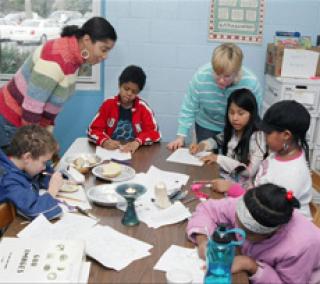Multicultural RE Training Offers a Transformative 15 Hours
By Pat Kahn

[Editors’ note: Through the Renaissance program, the Unitarian Universalist Association (UUA) offers continuing education for UU religious educators, including musicians, ministers, seminarians, and lay leaders. Each 15-hour module provides basic training in a topic area useful in religious education leadership.]
I first experienced the Multicultural Religious Education Renaissance module as a participant, in 1999, when I was a relatively new religious educator. I was blown away. For many years, I continued to process learnings from that module. My next experience was as a co-leader, during the field test of the revision about 10 years later. The module had had such a deep impact on me as a participant, I was anxious to create a similarly powerful experience for others, as a leader. And again, I was blown away.
So when I started working for the UUA, with Renaissance modules in my portfolio, I was excited to promote this valuable program, and especially to help districts, chapters, congregations and other groups offer Renaissance modules. The revision had been necessary; what it means to be multicultural had changed. In 1999, we focused almost exclusively on race. I don’t think I even knew what “transgender” meant. In 2010, the group discussions were both broader (the many elements of identity) and deeper.
Creating safe space for conversation is something important for any module, but it is particularly critical in this module, where people are dealing with their own identities and feelings, as well as the challenges and opportunities in their RE program and congregation. It can be overwhelming!
One of my favorite parts of my job is to summarize participants’ feedback after a Renaissance module. I know from experience that the Multicultural RE module is one of the most urgently needed in our congregations, but it’s also the least offered in most geographical areas. It has been offered only four times in three years. I wondered how to help people see that the Multicultural RE module can be a transformative experience. And the answer became quite obvious: Share the experiences of participants who have taken the revised module:
To be honest, I wasn’t that excited about taking this module. I had baggage from previous attempts in my congregation to become more multicultural, which haven’t worked so well. However, as I started to read [the assigned text, What If All the Kids Are White? by Louise Derman Sparks], I realized that there was a whole new positive approach that I hadn’t realized…The module…modeled for me a lot of the issues that many of us still need to work through, and how to do that in a respectful and compassionate way.
I expected a program akin to an equal opportunity employment training. I was more than thrilled that I was wrong!
I hoped the workshop would help me make sense of the intercultural communication workshop I attended [Who Are Our Neighbors?, a workshop provided by the Unitarian Universalist Ministers Association]. Although the topics were so similar, my learning in this module was far deeper, more meaningful, and [more] helpful than other workshops that I have attended.
Overall the module encouraged me to continue to focus on social justice learning in our RE program as well as adding more advocacy to my professional and personal life.
I was expecting a narrow focus on diversity as it specifically relates to race and nationality, but it was both and more specific than that. The tools were applicable for multiple situations, rather than just a classroom setting.
[I] did not anticipate being made aware of the diversity that already exists [in our congregations]. Yes, we went so far beyond my previous ideas about multiculturalism to include issues of gender, sexual identity, socioeconomic class, age, ability, and the power/privilege that may be more prevalent in some groups.
I expected perhaps to be overwhelmed and frustrated, worrying about how to bring back what I’d learned. Instead, I left thoughtful, confident, empowered and positive.
I am very, very glad I took this module and it’s probably the best one I’ve taken.
Next Steps!
Find out more about the Renaissance program. These training modules comprise a major component of UU Religious Education (RE) Credentialing.
Do you know of a multicultural religious education resource that you would like to share? Contact Pat Kahn at pkahn@uua.org.
Teaching Tolerance’s magazine and website comprise a comprehensive resource for multicultural training for educators. Explore their professional development modules and Perspectives online curriculum.
Louise Derman-Sparks gave the Fahs lecture at the 2012 UUA General Assembly. You can read about her lecture, find handouts, and watch online. Derman-Sparks is the co-author of Anti-Bias Education for Young Children and Ourselves (National Association for the Education of Young Children, 2009). A new book by Derman-Sparks, Debbie Lee Keenan, and John Nimmo, Leading Anti-Bias Early Childhood Programs: A Guide for Change, is ready for pre-order from the NAEYC.
The Teaching for Change website offers related resources including DVDs; “An Updated Guide for Selecting Anti-Bias Children’s Books” by Derman-Sparks; and free, downloadable (PDF) articles in English and Spanish on anti-bias teaching topics.
The Fall 2014 online edition of Rethinking Schools focuses on resources for educators to understand and confront racism.